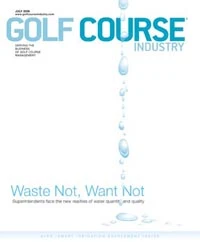During the past 20 years, my path in turfgrass management has allowed me the great fortune of observing and working with some highly successful, and not so successful, superintendents.
I’ve always tried to jot down every quote, practice and management philosophy from myself and others that have worked well or was a noted failure. For a few years, I’ve maintained and revised a written golf course management philosophy that has served as my personal mission statement. There are many people in this business who’ve helped to define my philosophy, and it’s impossible to give credit to everyone involved. Just know many of you in this profession have defined these rules in many ways.
So, as I scanned the multiple pages of notes like a scribe looking for a Bible verse, I realized the best way to summarize my philosophy was with a list. Hopefully, the information below can be implemented in another’s philosophy or career. If you don’t have a personal philosophy on golf course management, make one! It represents what you bring to the table. So here goes:
- Success or failure at a club is determined only by the respect you command from your staff and your perceived value to the club or facility. Dictatorships throughout history always fall and always will. Enable your people to perform, and they’ll reward you. You can rule with an iron fist, but you’d better wear a velvet glove.
- Prevent losing grass at all cost. You’re probably saying “duh,” but it’s amazing how soon people give up on turf and replace it. Sod and plugs never do as well as established turf. When it comes to greens, especially, replacing turf always costs the facility more money than turf-loss prevention. Replacing turf takes major labor hours, and also demoralizes a staff that’s worked many hours to keep turf healthy.
- Adapt with the changing environment. In our business, writing an agronomic plan on a calendar doesn’t mean it’ll get done. You must monitor your course and adjust your agronomic plan and timing accordingly. Things like watering before rain events, skipping cultural practices and applying unnecessary chemicals are irresponsible and costly. Be willing to work with your golf pro, switch dates for important practices and adjust to the changing climate. Oh yeah, and stick to your guns when you need something to happen. Your job is on the line.
- Surround yourself with quality people – and then support them completely. Give them all the credit for the facility’s success. As a leader, their success reflects on your management ability. Always hire for attitude first and skills second. Praise your staff at least twice as much as you critique them. How the facility operates when you’re not present is a direct reflection on you as a manager.
- Proper topdressing is always a benefit. It’s amazing how many times I hear someone say they don’t want to topdress. Come on, folks. This goes back to Old Tom Morris. Topdressing will only help turf. Choosing the wrong sand, wrong time of day, and what you do to the turf before and after topdressing is what harms turf. Sand alone doesn’t bruise, scar or dry out turf – we do!
- You can have too much grass. There is a big difference between dense turf and thatchy turf. Dense turf is healthy from being mowed frequently and topdressed to protect the crown, and has healthy roots from proper gas exchange. Thatch should be minimized at all cost. There’s a reason the trend in golf maintenance is for lower nitrogen inputs, verticutting, infrequent irrigation, etc. Plants that have room and air to grow and tiller can survive extreme conditions.
- Don’t run from complaints. You won’t be successful if you’re timid and avoid constant contact with your customers. We’re in the hospitality business. Superintendents strive to create an environment of relaxation and tranquility. Address all complaints with tact and diplomacy. You can disagree, debate and differ, but successful managers understand how to convert complaining customers into allies.
- Do what you say you’ll do. It’s so important to come through on your promises. When you agree to do something, do it in a timely manner and to the best of your ability. As leaders, superintendents must be consistent. No one is perfect, and mistakes can be made, but understand that being dependable is the key to success as a manager. GCI
Get curated news on YOUR industry.
Enter your email to receive our newsletters.
Explore the July 2008 Issue
Check out more from this issue and find your next story to read.
Latest from Golf Course Industry
- GCSAA’s Health in Action 5K/2K reaches fundraising goal
- Landscapes Golf Management to participate in data analyzation initiative
- Reel Turf Techs: Carl Michael
- Atlanta Athletic Club approves funding for master plan
- Maximizing Cultural Practices and Agronomic Benefits with Minimal Surface Disruption
- Real Answers about Spray Nozzle Choices
- From the Course to the Factory: How Customer Insights Drive Innovation
- New & Proven Enzyme Strategies for Sprayable Thatch Management





